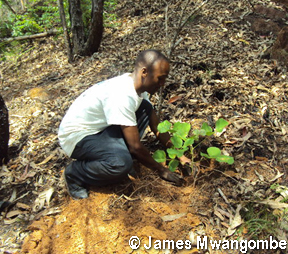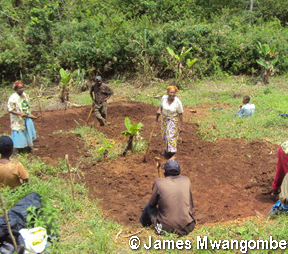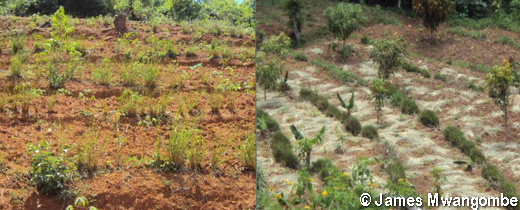The alternative livelihoods project to secure a future for he Sagalla caecilian never stops…
Tree planting

The weather has favoured tree planting this month, enabling us to plant 1,200 indigenous seedlings in an area of burnt exotic forest (mainly Eucalyptus). 4,000 seedlings in total will be planted in this area this season. The tree planting was undertaken by local youths, demonstrating how the past project initiatives have successfully bridged the gap between the young upcoming and old/seasoned conservationists. During the early stages, tree planting activities was undertaken mainly the women’s groups and primary school pupils. Among the tree species planted were Croton megalocurpus and Erythrina abysinicca
Fish Farming

Two sites for fish farming have been identified and already one is under construction. The quick uptake of fish farming activity demonstrates the communities’ interest in trialling fish farming as a sustainable livelihood.
Soil erosion control and agriculture improvement
Promotion of Vetiva grass, Chrysopogon zizanioides, previously known as Vetiver zizanioides continues. Although it has many uses, in this project, the grass has been targeted to serve two main ones: soil erosion control and agriculture improvement.
Soil erosion has been a major issue and will become an even greater issue in the future as population growth continues and land resources are more intensively used, often to a point of destruction. Increased soil erosion results in the loss of productive land, reduced soil fertility, greater rainwater runoff, less groundwater recharge, more sediment flows in rivers, higher contaminants in diminishing water supplies, lowered quality of drinking water, increased flooding, and diminished economic benefits and increased hardships to both rural and urban populations.
If applied correctly, the Vetiver System could be an important tool for reducing soil erosion, reduce rainwater runoff, improve groundwater recharge, remove pollutants from water, reduce the risk of flooding, and improve economic benefits to communities around Sagalla

The Vetiver System has many agricultural uses for: soil and water conservation, soil moisture improvement, groundwater recharge, recycling soil nutrients, pest control, mulch, forage, clean up of agricultural contaminated waste water, protection of farm infrastructure such as canals, drains, roads, and building sites. It reduces soil loss from farmland by reducing rainfall runoff thus significantly increasing the effective rainfall available to crops. The impact goes further as groundwater is recharged to the extent that ephemeral streams flow longer and stronger and wetlands are rejuvenated, wildlife habitat is improved and soil fertility improves, resulting in increased crop yields and enhanced food security.
A site for demonstration has been identified and planting started!